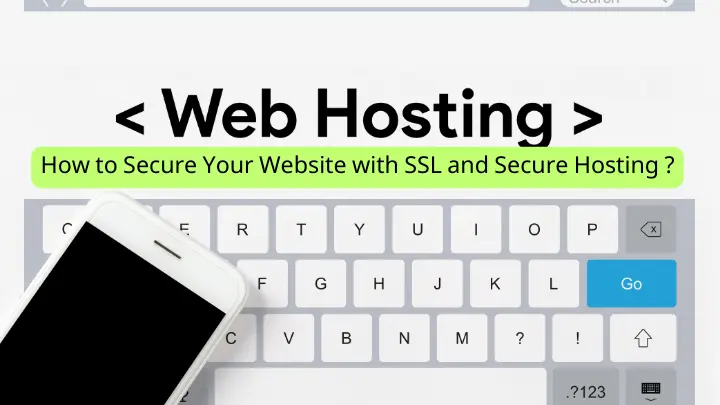How to Secure Your Website with SSL and Secure Hosting ?
In the digital age, website security is paramount. SSL (Secure Sockets Layer) and secure hosting are two critical components in safeguarding your website from threats and ensuring a safe browsing experience for your users. SSL encrypts data transmitted between your website and its visitors, while secure hosting provides a robust environment for your website’s files and data.

This comprehensive guide will walk you through how to secure your website using SSL and select the right hosting for optimal security.
1. Understanding SSL and Its Importance
1.1 What is SSL?
SSL is a security protocol that encrypts data exchanged between a web server and a user’s browser. It ensures that sensitive information, such as login credentials, payment details, and personal data, remains private and secure during transmission. Websites with SSL certificates display a padlock icon in the browser’s address bar and use the HTTPS protocol instead of HTTP.
1.2 Why is SSL Important?
- Data Encryption: SSL encrypts data to protect it from being intercepted by malicious actors during transmission.
- User Trust: Visitors are more likely to trust a website that uses HTTPS, which is often indicated by a padlock icon or green address bar in the browser.
- SEO Benefits: Search engines like Google consider HTTPS as a ranking factor, so having SSL can positively impact your website’s search engine rankings.
- Compliance: SSL is essential for compliance with data protection regulations such as GDPR and PCI-DSS, which require secure handling of personal and payment information.
2. How to Implement SSL on Your Website
2.1 Choose the Right SSL Certificate
- Domain Validated (DV) Certificates: Provides basic encryption and is suitable for personal websites and blogs. It verifies domain ownership only.
- Organization Validated (OV) Certificates: Offers a higher level of validation by verifying the organization’s details. Ideal for business websites.
- Extended Validation (EV) Certificates: Provides the highest level of validation, displaying the organization’s name in the browser’s address bar. Best for e-commerce sites and organizations handling sensitive information.
- Wildcard Certificates: Secures a main domain and all its subdomains with a single certificate. Useful for websites with multiple subdomains.
- Multi-Domain Certificates: Allows you to secure multiple domains with a single certificate. Suitable for businesses with several different websites.
2.2 Purchase and Install the SSL Certificate
- Purchase the Certificate: Buy an SSL certificate from a trusted Certificate Authority (CA) or your web hosting provider.
- Generate a CSR: Create a Certificate Signing Request (CSR) from your hosting control panel or server. This is a file containing your domain and company information that the CA will use to issue your certificate.
- Submit the CSR: Provide the CSR to the CA. They will verify your details and issue the SSL certificate.
- Install the Certificate: Follow the instructions provided by your CA or hosting provider to install the SSL certificate on your web server. This typically involves uploading the certificate files and configuring your web server to use SSL.
3 Test and Verify SSL Installation
- Check SSL Status: Use online tools such as SSL Labs’ SSL Test to verify that your SSL certificate is correctly installed and configured.
- Verify HTTPS: Ensure that your website displays HTTPS in the address bar and that the padlock icon appears, indicating that the connection is secure.
- Update Links: Update any internal and external links to use HTTPS instead of HTTP to prevent mixed content issues and improve security.
3. Ensuring Secure Hosting
3.1 Selecting a Secure Hosting Provider
- Reputation and Reliability: Choose a hosting provider with a strong reputation for security and reliability. Look for providers with positive reviews and high uptime guarantees.
- Security Features: Ensure that the hosting provider offers robust security features, such as firewalls, DDoS protection, and malware scanning.
- Regular Updates and Patching: Select a provider that regularly updates and patches their software to protect against vulnerabilities.
3.2 Types of Hosting and Their Security Implications
- Shared Hosting: In shared hosting, multiple websites share the same server resources. While cost-effective, it can be less secure due to the shared environment. Ensure that your provider offers strong isolation measures and security protocols.
- VPS Hosting: Virtual Private Server (VPS) hosting provides a dedicated portion of server resources, offering better security and control compared to shared hosting. It is suitable for websites with moderate to high traffic.
- Dedicated Hosting: Dedicated hosting gives you exclusive use of an entire server, providing the highest level of security and performance. It is ideal for high-traffic websites or those handling sensitive information.
- Cloud Hosting: Cloud hosting uses a network of servers to host websites, offering scalability and redundancy. Choose a cloud provider with strong security features and compliance with industry standards.
3.3 Configuring Hosting Security
- Use Strong Passwords: Ensure that all user accounts, including administrative and FTP accounts, use strong, unique passwords. Consider implementing multi-factor authentication (MFA) for added security.
- Regular Backups: Implement a regular backup schedule to ensure that your website data is protected and can be restored in case of a security breach or data loss.
- Security Monitoring: Use security monitoring tools and services to detect and respond to potential threats. Set up alerts for suspicious activities and review logs regularly.
- Access Controls: Limit access to your hosting account and server to authorized personnel only. Use permissions and roles to restrict access to sensitive areas.
4. Common Questions
4.1 How do I know if my SSL certificate is working properly?
To verify your SSL certificate, check for the HTTPS prefix and padlock icon in your browser’s address bar. Use tools like SSL Labs’ SSL Test to ensure proper installation and configuration.
4.2 Can I use a free SSL certificate for my website?
Free SSL certificates, such as those offered by Let’s Encrypt, provide basic encryption and are suitable for many websites. However, for higher levels of validation and additional features, you may consider purchasing a premium SSL certificate.
4.3 What is the difference between SSL and TLS?
SSL (Secure Sockets Layer) and TLS (Transport Layer Security) are both protocols for encrypting data transmitted over the internet. TLS is the successor to SSL and provides enhanced security. Most modern SSL certificates use TLS protocols.
4.4 How often should I renew my SSL certificate?
SSL certificates typically have a validity period of one to two years. It is important to renew your certificate before it expires to avoid security warnings and potential disruptions to your website.
4.5 What should I do if my website experiences a security breach?
If your website experiences a security breach, immediately contact your hosting provider and follow their incident response procedures. Assess the extent of the breach, restore backups, update passwords, and review security measures to prevent future incidents.
5. Conclusion
Securing your website with SSL and choosing a secure hosting provider are essential steps in protecting your online presence. SSL encryption ensures that data transmitted between your website and its visitors is secure, while a secure hosting environment provides the necessary infrastructure to safeguard your website’s files and data. By implementing SSL, selecting the right hosting type, and configuring robust security measures, you can enhance your website’s security, build user trust, and comply with regulatory requirements.



Pingback: Gator Web Hosting: Reliable & Affordable Solutions -